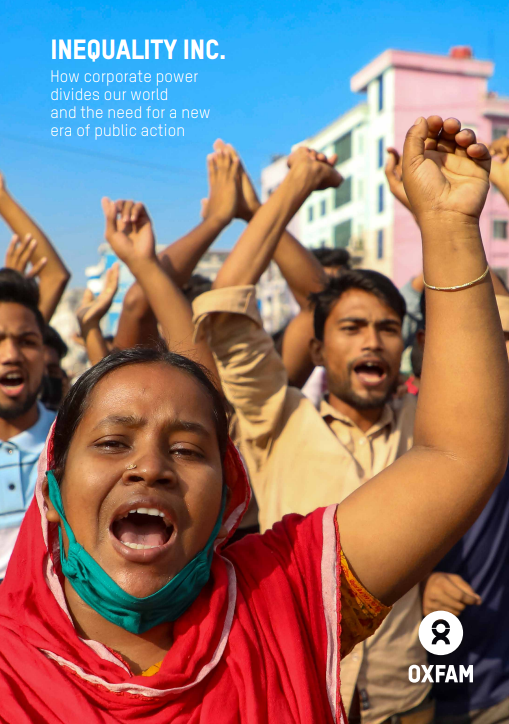OXFAM report 2024: Inequality Inc.

Since 2020, the world has witnessed the wealth of the top five billionaires doubling, while nearly five billion people globally have slid into poverty. The stark reality persists – it would take 230 years to eradicate poverty, instead a trillionaire could emerge within a decade.
Jeff Bezos, with a fortune of $167.4 billion, epitomizes immense wealth, growing by $32.7 billion since 2020. The incongruity of Bezos' space escapades and Amazon workers enduring harsh conditions and anti-union endeavors is emblematic of corporate disparities.
The wealth of the top five billionaires has doubled this decade, paralleling a 60% increase in global poverty. Corporate practices, from worker exploitation to tax evasion, contribute to this stark imbalance. Oxfam issues a dire warning – without intervention, extreme inequality could become the new norm.
Billionaires' wealth has surged by 34%, accumulating $3.3 trillion this decade. The Global North, housing 21% of the population, possesses 69% of private wealth and 74% of billionaire wealth. Profits soar for major corporations, with 82% benefiting wealthy shareholders.
The report uncovers the nexus between rising billionaire wealth and corporate power, revealing that the top 1% owns 43% of global financial assets. Among the top 50 corporations, billionaires hold key positions in 34%, boasting a combined market capitalization of $13.3 trillion.
The current epoch witnesses corporations controlling markets, shaping exchanges, and profiting unchecked, impacting sectors like pharmaceuticals, technology, and agriculture, resulting in increased prices and diminished competition.
Corporate power suppresses wages, causing a $1.5 trillion loss for 791 million workers in two years, disproportionately affecting women and racialized individuals, while also contributing to climate change,disproportionately impacting marginalized communities. Corporate power invades the public sector, commodifying essential services, and deepening inequalities. Moreover, corporations engage in tax avoidance, reducing corporate tax revenue and depriving governments, especially in the Global South.
The report concludes with three practical measures to curb corporate power:
-
-Governments must proactively provide public services, invest in infrastructure, and explore public monopolies.
-
-Break up monopolies, empower workers, and significantly increase taxes on corporations and the wealthy.
-
-Governments should promote equitable business models, support worker cooperatives, and use economic instruments to incentivize responsible business practices.
The revitalization of the state emerges as a central theme in combating corporate power and inequality. Governments are urged to act as providers of public goods, influencers of markets, correctors of market failures, and owners/operators of national commercial ventures. The state's proactive role encompasses guaranteeing inequality-busting public services, investing in critical infrastructure, exploring public monopolies, enhancing transparency, and enforcing regulations to ensure the private sector serves the common good.
Governments are called upon to use their power to rein in corporate excesses, with a focus on breaking up private monopolies, curbing corporate power, and democratizing trade. Lessons are drawn from historical successes in tackling wealth concentration. Empowering workers and communities, ensuring living wages, and committing to climate and gender justice are crucial steps. Binding measures to safeguard the rights of women and racialized peoples, along with environmental and human rights due diligence, are deemed essential.
The report underscores the need for governments to actively shape and repurpose the private sector. Beyond profit-centric corporations, emphasis is placed on promoting businesses that prioritize worker and community interests – worker cooperatives, social enterprises, and fair-trade entities. Governments are urged to provide financial support to such equitable businesses, utilizing economic instruments and public procurement to prioritize responsible business models.
In a world where inequality is a global challenge, the report stresses the importance of multilateral action. Global institutions like the G20, led by influential governments, are positioned to play a crucial role in setting clear targets for inequality reduction. The report aligns with the proposal that every nation should aim for a situation where the bottom 40% of the population has an income comparable to the richest 10%, known as a Palma of 1.
Governments should use their power to reshape the private sector by promoting businesses that prioritize stakeholders, including worker cooperatives, social enterprises, and fair-trade entities. They must provide financial support and use economic tools like tax incentives and public procurement to favor equitable business models. Economic aid and government contracts should be conditional on companies meeting criteria such as net-zero targets, fair wages, and tax compliance. The aim is to shift focus from shareholder greed to a more ethical and inclusive business landscape.
A more equal world is possible if governments effectively regulate and reimagine the private sector.

